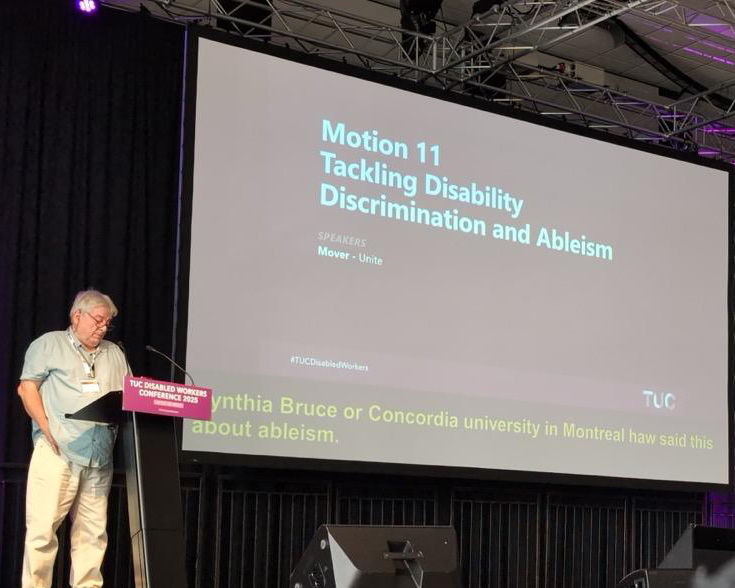Tackling Disability Discrimination and Ableism
- kevinndaws
- Jun 30
- 3 min read
The subject of ableism has not always been properly addressed at the TUC Disabled Workers Conference, but this year it was. The Unite motion entitled 'Tackling Disability Discrimination and Ableism' was moved by Craig Duerden who spoke of the challenges faced by people with disabilities especially the ableist attitudes of non-disabled people.
In moving the motion Craig made clear what ableism means and some of the consequences when he said:

"Ableism means that the needs of non-disabled people are prioritised and the needs of people with disabilities are ignored
Ableism assumes that non-disabled people are more 'valuable' than people with disabilities.
Ableism favours non-disabled people over people with disabilities
Ableism is based on the assumption, and the prejudice, that everyone in society is non-disabled, which clearly is not true."
It was good to see that ableism was also mentioned in some of the other motions and a number of the speeches at the conference.
The Unite motion was seconded by Kevin Daws on behalf of UCU who asked "So what do we mean by ableism?"
To help him do this he quoted Professor Cynthia Bruce of Concordia University in Montreal who said this about ableism:
“Ableism is a set of beliefs that views disability as bad and normality as good. This mindset makes disabled people feel that they - or their disabilities - are the problem preventing them from participating in life.
Instead of recognizing that inaccessibility and discrimination are the real issues, society often puts the burden on disabled individuals to find their own ways to access opportunities.
This creates pressure to focus on overcoming perceived weaknesses and to conform to what is considered "normal."
Disabled individuals often feel they must work harder to fit in, especially in spaces like schools and workplaces. In short, ableism leads to the belief that people with disabilities are responsible for their own access and participation, suggesting they need to "get better" or "be more normal."”
Conference, in reality ableism is discrimination and prejudice against people with disabilities, based on the idea that people with ‘typical’ abilities are superior. It is discrimination in favour of able-bodied people.
One more quote from Dr Maureen Wideman recently retired Professor at the University of Fraser Valley in British Columbia, who made the important point:
“When someone constantly must advocate for access—whether to policies, buildings, or learning environments - it indicates that something isn't right. Many of these environments are designed by able-bodied people and don’t consider the needs of those with disabilities.”
Does that sound familiar to you?

How many of us have, at least metaphorically, been banging our heads against a brick wall trying to get someone to listen to what we are saying and to do something about it?
Those people that we are trying to challenge may wish that we would just go away and keep quiet, but conference we will NOT go away.
Conference, in ableist societies, the lives of people with disabilities are considered less worth living, or people with disabilities are less valuable, even sometimes expendable.
Isn’t this the attitude that was displayed towards people with disabilities during the Covid Pandemic?
Conference, ableism in British Society is a huge problem but we have to face that challenge head on and say to our employers, our trade unions and anyone else imposing their ableist values on us that we will not tolerate their ableism anymore.
In concluding his speech Craig highlighted the fact that people with disabilities currently living in the UK are having to deal with negative stereotypes and lies.

He also pointed out that the negative stereotypes and the the mantra this creates, leads to the general public associating ‘Welfare’ with a cost to them
It has also directly contributed to an increase in hate crime against disabled people which is underreported
Craig concluded by emphasising that Discrimination and ableist attitudes have also allowed the many Social Care abuse scandals, directly involving the treatment of people with disabilities, to keep on occurring.
Conference support this motion and say NO to Disability Discrimination and Ableism

Easy Read version of this article produced by Carinder Malhi




Comments